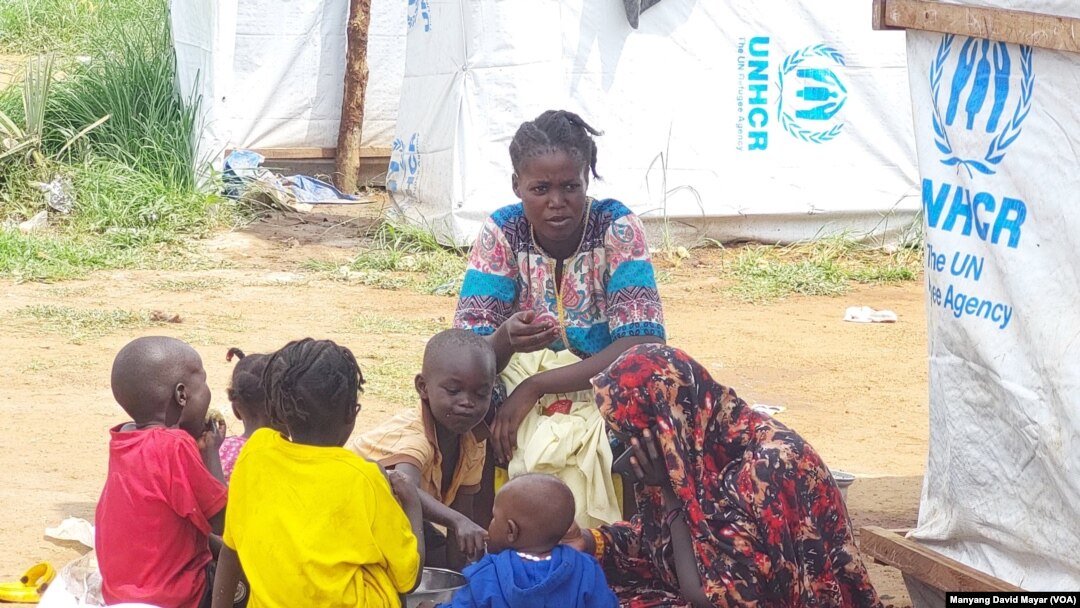Osman Omar Mohamed, his wife, and four children found themselves caught in the crossfire as gun battles spread to their hometown of Nyala, in South Darfur State, Sudan, in May.
Speaking to VOA at Gorom refugee settlement on Thursday, Mohamed recounted how heavy artillery repeatedly struck their compound forcing them to flee.
"We were all under the bed, and these children were crying while the fighting continued until 8 pm. Again, at 9 pm, it continued, with bombs and bodies of people killed all around us. At 2 am, we decided to withdraw from the area. We headed southward into farmland, and then the children began feeling frightened due to the issues of security," he explained.
Though Mohamed's family is now safe at the Gorom settlement camp, he says the memories of the experience still haunt his 6-year-old daughter.
"She has developed a spirit of fear. Her weight now at six years is the same as her 2-year-old sister's because she has refused to eat anything for three months. Whenever she hears a sound, she feels frightened. Whenever a utensil drops down, she becomes afraid. This is the condition that I am in now with this girl," he revealed.
Mohamed's daughter is not the only one traumatized by the conflict in parts of Sudan.
Sudanese refugees living in the camp near South Sudan's capital, Juba, shared that many of them are also haunted by painful experiences from the conflict.
Ibrahim Jam-Allah, a Sudanese refugee residing in Gorom, disclosed that several refugees are living with vivid memories of the violence they witnessed in Sudan.
"There are people who jump up at night and run. Some people start crying while sleeping. Those without a strong heart are suffering because they saw families killed at the same time in one place, including children. I saw them with my eyes and carried them in my arms when I was working at the hospital in al-Fashir," he said.
Al-Fashir is a town in the Darfur region which has seen continued violence including alleged reports of ethnically targeted violence.
A recent United Nations report revealed that at least 87 people, including ethnic Masalits, were buried in a mass grave attributed to the Rapid Support Forces, RSF.
The paramilitary group denied any involvement in the killings in El Geneina, in West Darfur, where witnesses and rights groups reported waves of attacks between the RSF and Arab militias against the non-Arab Masalit people, including shootings at close range.
The International Criminal Court said it is investigating the findings in the U.N. report.
Affaf Sheriff Ahmed, another refugee at Gorom camp, witnessed some of her neighbors killed and several bodies littering the streets of Khartoum when she fled to South Sudan.
She said the memories of what she saw in Khartoum still linger.
"Several times whenever I am sleeping, I feel like the fighting has started again. I feel frightened. At times, I just find myself crying at night. Many other people feel like me, especially those who saw a lot of bad things like me," she explained.
In response to the increasing number of traumatized Sudanese refugees, the Africa Committee for the Rehabilitation of Southern Sudan, ACROSS, partnered with the United Nations High Commissioner for Refugees, UNHCR, to provide humanitarian support at Gorom refugee settlement.
Levi Moga, the program manager at ACROSS, stated that the non-profit is offering psycho-social support to those deeply affected by the conflict in Sudan.
"We have a protection team of three case workers, a protection assistant, a protection officer, and a social worker. They are available in the camp to provide psycho-social support and counseling. Additionally, we have a psychologist on staff," he said.
Due to their nature, Moga said most cases remain confidential.
According to the South Sudan’s Commission for Refugee Affairs, Gorom currently houses approximately 9,000 registered Sudanese refugees, located west of Juba town.
Conflict in Sudan has driven around 3.1 million people from their homes, including more than 700,000 who have fled to neighboring countries, according to the United Nations.


